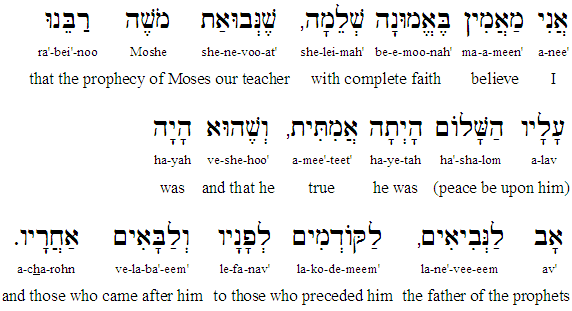|
|
||||||||||||||||||||||
 |
||||||||||||||||||||||
|
Learn Hebrew |
||||||||||||||||||||||
 |
||||||||||||||||||||||
|
Learn Torah |
||||||||||||||||||||||
|
|
|
The seventh principle of Jewish faith is the belief that Moses is the "father of the prophets," by which it is meant that Moses is the greatest of the prophets of all time. |
 |
||||||||
|
|
||||||||
|
"I believe with complete faith that the prophecy of Moses our teacher, peace upon him, was true and that he was the father of the prophets, both to those who preceded him and to those who came after him." |
||||||||
|
The LORD your God will raise up for you a prophet like me from among you, from your brothers, it is to him you shall listen (Deut 18:15; cp. 18:18-19). |
||||||||
|
In addition, there is an epistemic problem with the idea that Moses is the greatest of the prophets of all time. Since direct revelation from the LORD is on par epistemologically, then the Prophet whom Moses foretells should be heeded as one with the same authority as Moses. As Moses himself wrote on behalf of YHVH: I will raise up for them a prophet like you from among their brothers. And I will put my words in his mouth, and he shall speak to them all that I command him. And whoever will not listen to my words that he shall speak in my name, I myself will require it of him." (Deuteronomy 18:18-19). If a prophet receives direct revelation from the LORD God and communicates this revelation clearly, then the same warrant for belief and justification for obedience must be accorded as is given to Moses. In addition, the idea that revelation could not be surpassed by anyone after Moses implies that Rabbinic Judasim is essentially static and closed to the possibility of further intervention from the LORD, ironically, including prophetic messages regarding the coming of the Mashiach Himself! |
||||||||
|
In the Brit Chadashah: Therefore, holy brothers, you who share in a heavenly calling, consider Yeshua, the Emissary and Kohen HaGadol of our confession, who was faithful to him who appointed him, just as Moses also was faithful in all God's house. For Yeshua has been counted worthy of more glory than Moses - as much more glory as the builder of a house has more honor than the house itself. (For every house is built by someone, but the builder of all things is God.) Now Moses was faithful in all God's house as a servant, to testify to the things that were to be spoken later, but Mashiach is faithful over God's house as a Son. And we are his house if indeed we hold fast our confidence and our boasting in our hope. (Hebrews 3:1-6) The administration of the Sinaitic covenant, with the Levitical priesthood and its ordinances, is called a "shadow" of things to come: They (i.e., the Cermonial Law and its ordinances) serve as a copy and shadow of the heavenly things. For when Moses was about to erect the tent, he was instructed by God, saying, "See that you make everything according to the pattern that was shown you on the mountain." (Hebrews 8:5) Indeed, Yeshua is our "Better Hope" and the Savior from all that the Torah of Moses was incapable of doing for us: Let it be known to you therefore, brothers, that through this man (Yeshua) forgiveness of sins is proclaimed to you, and by Him everyone who believes is justified from all things from which you could not be justified by the law of Moses. (Acts 13:38-9) |
|
For the law (Torah) was given through Moses; |
||
|
|
|
Hebrew for Christians |
|||||
|
|||||